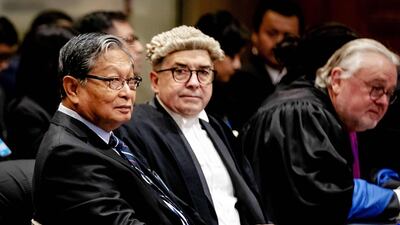The UN's top court has ordered emergency measures against Myanmar to prevent genocide against Rohingya Muslims.
The landmark ruling by the International Court of Justice (ICJ) comes days after a Myanmar commission concluded that some soldiers were likely to have committed war crimes against the minority group but that the military was not guilty of genocide.
The court's president, Judge Abdulqawi Ahmed Yusuf, said the ICJ "is of the opinion that the Rohingya in Myanmar remain extremely vulnerable”.
In a unanimous decision, the court added that its order for provisional measures intended to protect the Rohingya is binding "and creates international legal obligations" on Myanmar.
The court also ordered Myanmar to "take effective measures to prevent the destruction and ensure the preservation of evidence related" to allegations of genocidal acts.
Yasmin Ullah, a Ronhingya activist who lives in Vancouver and was in court for the decision, called it a historic ruling.
“Having the judges unanimously agree to the protection of Rohingya means so much to us because we're now allowed to exist and it's legally binding," she said.
Myanmar has also been ordered to report back to the court in four months on what measures the country has taken to comply with the order and then to report every six months as the case moves slowly through the world court.
The mainly Muslim African nation of The Gambia brought the case against Myanmar after 740,000 Rohingya fled to neighbouring Bangladesh after a military-led crackdown in 2017, carrying accounts of widespread rape, arson and mass killings.
UN investigators concluded that the military campaign had been executed with "genocidal intent".
Nicholas Bequelin, Amnesty International’s South Asia Regional Director, said: “The decision sends a message to Myanmar’s senior officials: the world will not tolerate their atrocities, and will not blindly accept their empty rhetoric on the reality in Rakhine State today.
“An estimated 600,000 Rohingya who remain there are routinely and systematically denied their most basic rights. They face a real risk of further atrocities.
“Myanmar must comply with the ICJ’s ruling and take immediate action to cease ongoing violations against the community and to prevent the destruction of evidence."
In December Myanmar's civilian leader Aung San Suu Kyi had travelled to The Hague to personally defend her Buddhist-majority country against the allegations over the bloody 2017 crackdown on the Rohingya.
Suu Kyi, winner of the Nobel Peace Prize in 1991, had asked the judges to drop the case arguing that her country was capable of investigating any allegations of abuse and warned that the case could reignite the crisis.
Moments before the court began reading its ruling, Suu Kyi told the Financial Times war crimes may have been committed against Rohingya Muslims but that refugees had exaggerated the abuses against them.
But in its ruling, Judge Yusuf said: "The court is of the opinion that the Rohingya in Myanmar remain extremely vulnerable.
"Moreover, the court is of the opinion that the steps which claimed to have taken to facilitate the return of Rohingya refugees present in Bangladesh, to promote ethnic reconciliation, peace and stability in Rakhine State, and to make its military accountable for violations of international humanitarian and human rights law, do not appear sufficient."
The World Court's rulings are final and without appeal, although it has no real way of enforcing them.
Burma Campaign UK has welcomed the announcement but says international pressure is need to ensure it is adhered to.
“The ICJ ruling is a major blow to Aung San Suu Kyi and her anti-Rohingya policies,” said Anna Roberts, Executive Director of Burma Campaign UK.
“The priority now is to apply pressure on Aung San Suu Kyi and the military to implement the Court’s decision. The chances of Aung San Suu Kyi implementing this ruling will be zero unless significant international pressure is applied. So far, the international community has not been willing to apply pressure on Aung San Suu Kyi over her own appalling record on human rights.”
More than 100 Myanmar civil society groups published a statement saying they hoped international justice efforts would "bring forth the truth" and end impunity.
"Political and military policies have always been imposed with violent force and intimidation upon the people of Myanmar, systematically and institutionally, on the basis of their political and religious beliefs and ethnic identities and continue until the present," the statement said.
"We understand very clearly that the ICJ case against Myanmar is directed towards those responsible for using political power and military might, and not to the people of Myanmar."
On Monday a Myanmar-appointed "Independent Commission Of Enquiry" went the furthest that any investigation by the country has gone so far in accepting atrocities occurred.
The panel said some security personnel had used disproportionate force and committed war crimes and serious human rights violations, including the "killing of innocent villagers and destruction of their homes".
But it said there was "insufficient evidence" of genocide.
Param-Preet Singh, associate international justice director of New York-based Human Rights Watch, said: “The ICJ order to Myanmar to take concrete steps to prevent the genocide of the Rohingya is a landmark step to stop further atrocities against one of the world’s most persecuted people.
"Concerned governments and U.N. bodies should now weigh in to ensure that the order is enforced as the genocide case moves forward.”
The Gambia brought the case with the backing of the 57-nation Organisation for Islamic Cooperation. Canada and the Netherlands have since also lent their support.
Judges did not rule Thursday on the substance of the case, which will be debated in legal arguments likely to last years. But their order to protect the Rohingya made clear they fear for ongoing attacks.


